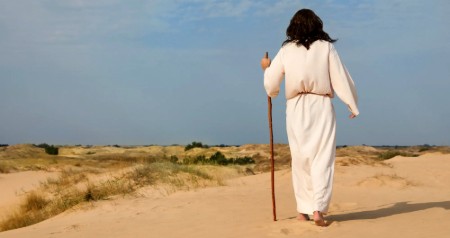Destroyed Coptic Church Building in Egypt Reconstructed in Time for Easter Liturgy
FREE Catholic Classes
The church was attacked on the evening of March 4, after an imam told Muslim villagers to "Kill all the Christians". The rioters set fire to the church and demolished a large part of what was left by hand and with sledgehammers.
Highlights
Compass Direct News (www.compassdirect.org/)
4/28/2011 (1 decade ago)
Published in Middle East
Keywords: Coptic Orthodox, Jihadis, Muslim extremists, Egypt, persecution
P>CAIRO, Egypt (Compass Direct News) - Fewer than 40 days after a mob of Muslim villagers in Egypt left a church's building in ruins, the congregation celebrated Easter on Sunday (April 24) in a reconstructed building at the same site.
The reconstruction of the church building by the Egyptian military gave Christians in Egypt cause to celebrate, but it came during a new outbreak of sectarian violence across the country.
The Rev. Balamoun Youakeem, head parish priest for the Church of the Two Martyrs St. George and St. Mina in the village of Sool, located in Helwan 35 kilometers (22 miles) south of Cairo, said the reconstruction was finished in "amazing time."
"Everything is back to normal," he said. "They even did nice decoration work, wood work, on the altar cover. It cost them a lot of money; the church looks beautiful at the moment."
Youakeem said the rebuilding was carried out over the objections of villagers who protested outside a meeting of military leaders and traditional village elders. The villagers stood outside the meeting chanting, "We don't want the church," according to Youakeem.
Riots and Burning
The church was attacked on the evening of March 4, after an imam told Muslim villagers to "Kill all the Christians" in response to a rumor of an affair between a Muslim man and a Christian woman, both married to other people. The rioters set fire to the church and demolished a large part of what was left by hand and with sledgehammers.
They then set up a sign declaring the site to be the "Rahmah Mosque" and held a prayer service inside the church ruins.
The villagers had rampaged through the area attacking Christian-owned homes, and some sexually assaulted several Christian women, according to area residents. Many Christians fled their homes in fear of further attacks.
Two days later, 2,000 Coptic Christians gathered outside the Radio and Television Building in Cairo to protest the lack of government response to the attack. On March 6, at a protest outside an area of Cairo commonly known as Garbage City, groups of Coptic men and teens blocked traffic and eventually pelted passing cars with rocks. Government troops moved in to stop the protest, and in the ensuing melee with Muslim counter-protestors, 13 Copts were killed and between 50 and 100 people were injured. Around this time, the army committed to reconstructing the church building.
Youakeem said he initially didn't think the church building would be rebuilt. While mosques are often built without permission and the government pays the salaries of approved imams, it is notoriously difficult to get a permit to do even the most basic of repairs on church buildings.
"When the church was demolished, the hope to rebuild it was so small," he said. "This is our miracle."
An example of how hard it can be to repair a church building in Egypt can be found in an incident surrounding the Virgin Mary and Archangel Church in Omraniya, Giza. In November 2010, two Copts were killed and dozens were injured in a protest after local authorities stopped construction at the church site claiming renovations did not match permits the government had granted.
Church officials said repeatedly that they had permits for the construction but never publically addressed the issue of the alleged discrepancy.
Also, on Feb. 17 in the village of El-Hathatah near Minya, 231 kilometers (144 miles) south of Cairo, a group of townspeople attacked the congregation of St. George's Church with bricks and rocks. Townspeople were angry about a roof the congregation was constructing next to the church building with local government permission. Eventually area police had to step in to stop the attacks.
Wide-spread Troubles
No one has been criminally charged for attacking the church in Sool, and Youakeem said he is fearful of what would happen if any arrests were made.
"I personally think if someone gets arrested, it will start up the anger again," he said. "God will sort it out in His own way."
The residents that fled have since returned to their homes, Youakeem said. The Easter services at the church went peacefully, thanks in part to a large army presence in the village. But other towns haven't been so lucky. In Minya, a fight on April 19 between a Copt and a Muslim over the placement of a privately placed speed bump spread, and two Muslims were killed. Groups of Muslims retaliated, attacking Christians along with their homes and businesses.
Samia Sidhom, managing editor of the weekly Al-Watani newspaper, which caters to the Coptic population, said group punishment such as what occurred in Minya is common in Egypt. Copts are targeted not for their connection to any alleged incident, but merely for their identity as Christians.
"It's the way that Muslims punish Copts," she said. "If one person does something, they feel they should all be punished."
In Qena, a city in the heart of southern Egypt, crowds protested for almost two weeks starting on April 14 over the appointment of a governor who is Coptic Orthodox. Protestors blocked roads and the rail system serving Qena. Salafis, a sect of Muslims who want to impose an austere form of Islam over Egypt, led the protests.
The protestors demanded that Emad Mikhail not be installed, claiming that as a Christian he wouldn't be able to properly execute Islamic law. A concurrent theme in the protests was the claim that Mikhail had connections to the police forces of the now-deposed Hosni Mubarak regime. Sidhom said the protestors created this reasoning after the fact.
"I think it was because he is a Christian," Sidhom said. "His history is okay. He has no history [with Mubarak]. Actually, he worked with the ministry that deals with tax evasion. The Qena residents didn't want him there because he was a Copt."
On April 26, the government suspended Mikhail's appointment to the governor's post for three months.
Contributing to tensions, Sidhom said, is an unwritten quota system in Egypt whereby a certain number of Copts are placed in positions of government authority. The previous governor of Qena, a Copt, was roundly opposed by both Muslims and Copts, as he was considered largely inept at addressing numerous attacks against Christians.
"The Muslims didn't like him because he was a Copt, and the Copts didn't like him because they thought he was a coward," Sidhom said.
Although the Muslim majority's attitude toward the Christian minority hasn't changed in the aftermath of the recent revolution in Egypt, Sidhom said, the nascent government is unable or unwilling to oppose the public about anti-Christian violence.
"The official line is they don't want to go against the wishes of the crowd," she said. "Of course, this means the Copts get more and more unjust treatment."
---
Compass Direct News is a news service dedicated to providing exclusive news, penetrating reports, moving interviews and insightful analyses of situations and events facing Christians persecuted for their faith.
Join the Movement
When you sign up below, you don't just join an email list - you're joining an entire movement for Free world class Catholic education.
-

-
Mysteries of the Rosary
-
St. Faustina Kowalska
-
Litany of the Blessed Virgin Mary
-
Saint of the Day for Wednesday, Oct 4th, 2023
-
Popular Saints
-
St. Francis of Assisi
-
Bible
-
Female / Women Saints
-
7 Morning Prayers you need to get your day started with God
-
Litany of the Blessed Virgin Mary
Introducing "Journey with the Messiah" - A Revolutionary Way to Experience the Bible
-

A Future for Life: Introducing the Winners of the Priests for Life Pro-Life Essay Contest
-

Reflections on Pope Francis' 2025 World Day of Peace message
-
Exposing the Dark Reality of Sex Trafficking
-
Trump's Bold Geopolitical Moves: A Call for Reflection from a Catholic Perspective
Daily Catholic
 Daily Readings for Friday, January 10, 2025
Daily Readings for Friday, January 10, 2025 St. William of Bourges: Saint of the Day for Friday, January 10, 2025
St. William of Bourges: Saint of the Day for Friday, January 10, 2025 Prayer for a Blessing on the New Year: Prayer of the Day for Tuesday, December 31, 2024
Prayer for a Blessing on the New Year: Prayer of the Day for Tuesday, December 31, 2024- Daily Readings for Thursday, January 09, 2025
- St. Adrian, Abbot: Saint of the Day for Thursday, January 09, 2025
- St. Theresa of the Child Jesus: Prayer of the Day for Monday, December 30, 2024
![]()
Copyright 2024 Catholic Online. All materials contained on this site, whether written, audible or visual are the exclusive property of Catholic Online and are protected under U.S. and International copyright laws, © Copyright 2024 Catholic Online. Any unauthorized use, without prior written consent of Catholic Online is strictly forbidden and prohibited.
Catholic Online is a Project of Your Catholic Voice Foundation, a Not-for-Profit Corporation. Your Catholic Voice Foundation has been granted a recognition of tax exemption under Section 501(c)(3) of the Internal Revenue Code. Federal Tax Identification Number: 81-0596847. Your gift is tax-deductible as allowed by law.







 Daily Readings for Friday, January 10, 2025
Daily Readings for Friday, January 10, 2025 St. William of Bourges: Saint of the Day for Friday, January 10, 2025
St. William of Bourges: Saint of the Day for Friday, January 10, 2025 Prayer for a Blessing on the New Year: Prayer of the Day for Tuesday, December 31, 2024
Prayer for a Blessing on the New Year: Prayer of the Day for Tuesday, December 31, 2024

